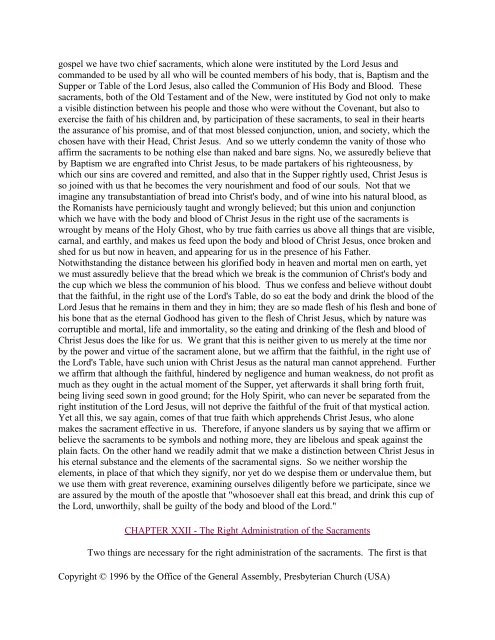The Book of Confessions - The Presbyterian Leader
The Book of Confessions - The Presbyterian Leader
The Book of Confessions - The Presbyterian Leader
Create successful ePaper yourself
Turn your PDF publications into a flip-book with our unique Google optimized e-Paper software.
gospel we have two chief sacraments, which alone were instituted by the Lord Jesus and<br />
commanded to be used by all who will be counted members <strong>of</strong> his body, that is, Baptism and the<br />
Supper or Table <strong>of</strong> the Lord Jesus, also called the Communion <strong>of</strong> His Body and Blood. <strong>The</strong>se<br />
sacraments, both <strong>of</strong> the Old Testament and <strong>of</strong> the New, were instituted by God not only to make<br />
a visible distinction between his people and those who were without the Covenant, but also to<br />
exercise the faith <strong>of</strong> his children and, by participation <strong>of</strong> these sacraments, to seal in their hearts<br />
the assurance <strong>of</strong> his promise, and <strong>of</strong> that most blessed conjunction, union, and society, which the<br />
chosen have with their Head, Christ Jesus. And so we utterly condemn the vanity <strong>of</strong> those who<br />
affirm the sacraments to be nothing else than naked and bare signs. No, we assuredly believe that<br />
by Baptism we are engrafted into Christ Jesus, to be made partakers <strong>of</strong> his righteousness, by<br />
which our sins are covered and remitted, and also that in the Supper rightly used, Christ Jesus is<br />
so joined with us that he becomes the very nourishment and food <strong>of</strong> our souls. Not that we<br />
imagine any transubstantiation <strong>of</strong> bread into Christ's body, and <strong>of</strong> wine into his natural blood, as<br />
the Romanists have perniciously taught and wrongly believed; but this union and conjunction<br />
which we have with the body and blood <strong>of</strong> Christ Jesus in the right use <strong>of</strong> the sacraments is<br />
wrought by means <strong>of</strong> the Holy Ghost, who by true faith carries us above all things that are visible,<br />
carnal, and earthly, and makes us feed upon the body and blood <strong>of</strong> Christ Jesus, once broken and<br />
shed for us but now in heaven, and appearing for us in the presence <strong>of</strong> his Father.<br />
Notwithstanding the distance between his glorified body in heaven and mortal men on earth, yet<br />
we must assuredly believe that the bread which we break is the communion <strong>of</strong> Christ's body and<br />
the cup which we bless the communion <strong>of</strong> his blood. Thus we confess and believe without doubt<br />
that the faithful, in the right use <strong>of</strong> the Lord's Table, do so eat the body and drink the blood <strong>of</strong> the<br />
Lord Jesus that he remains in them and they in him; they are so made flesh <strong>of</strong> his flesh and bone <strong>of</strong><br />
his bone that as the eternal Godhood has given to the flesh <strong>of</strong> Christ Jesus, which by nature was<br />
corruptible and mortal, life and immortality, so the eating and drinking <strong>of</strong> the flesh and blood <strong>of</strong><br />
Christ Jesus does the like for us. We grant that this is neither given to us merely at the time nor<br />
by the power and virtue <strong>of</strong> the sacrament alone, but we affirm that the faithful, in the right use <strong>of</strong><br />
the Lord's Table, have such union with Christ Jesus as the natural man cannot apprehend. Further<br />
we affirm that although the faithful, hindered by negligence and human weakness, do not pr<strong>of</strong>it as<br />
much as they ought in the actual moment <strong>of</strong> the Supper, yet afterwards it shall bring forth fruit,<br />
being living seed sown in good ground; for the Holy Spirit, who can never be separated from the<br />
right institution <strong>of</strong> the Lord Jesus, will not deprive the faithful <strong>of</strong> the fruit <strong>of</strong> that mystical action.<br />
Yet all this, we say again, comes <strong>of</strong> that true faith which apprehends Christ Jesus, who alone<br />
makes the sacrament effective in us. <strong>The</strong>refore, if anyone slanders us by saying that we affirm or<br />
believe the sacraments to be symbols and nothing more, they are libelous and speak against the<br />
plain facts. On the other hand we readily admit that we make a distinction between Christ Jesus in<br />
his eternal substance and the elements <strong>of</strong> the sacramental signs. So we neither worship the<br />
elements, in place <strong>of</strong> that which they signify, nor yet do we despise them or undervalue them, but<br />
we use them with great reverence, examining ourselves diligently before we participate, since we<br />
are assured by the mouth <strong>of</strong> the apostle that "whosoever shall eat this bread, and drink this cup <strong>of</strong><br />
the Lord, unworthily, shall be guilty <strong>of</strong> the body and blood <strong>of</strong> the Lord."<br />
CHAPTER XXII - <strong>The</strong> Right Administration <strong>of</strong> the Sacraments<br />
Two things are necessary for the right administration <strong>of</strong> the sacraments. <strong>The</strong> first is that<br />
Copyright © 1996 by the Office <strong>of</strong> the General Assembly, <strong>Presbyterian</strong> Church (USA)




